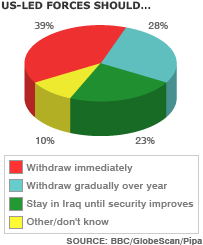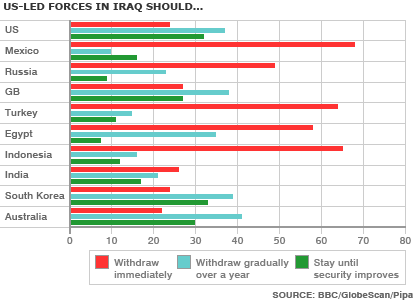| Tweet |
(回答先: Re: test 投稿者 gataro 日時 2007 年 9 月 03 日 09:34:26)
「しんぶん赤旗」9月9日付6面から直接貼り付け。
イラク 米軍主導の多国籍軍
「撤退を」が国際世論
「1年以内に」67% 22ヵ国調査 英BBC
【ロンドン=岡崎衆史】英BBC放送は七日、世界二十ニカ国を対象にした世論調査を発表し、約三分の二にあたる67%が米軍主導の多国籍軍の一年以内のイラク撤退を求めていることを明らかにしました。このうち即時撤退を求める人は39%でした。一年以内の段階的撤退を求める人は28%となっています。「治安改善まで滞在する」ことを望む人は23%でした。
BBCが昨年二月に発表した三十五カ国を対象にした世論調査では、早期撤退を求める人が50%で、治安改善までの駐留を支持する人が35%でした。今回の調査では、駐留支持が減る一方で、撤退支持が急増していることが分かりました。
調査対象となった二十ニカ国のうち、「一年以内の撤退」支持が過半数を超えた国は十九カ国に上りました。
米国では、即時撤退支持(24%)と一年以内の段階撤退支持が合わせて61%、「治安改善までの駐留」支持は32%でした。
イラクに派兵している米国の同盟国のうち、米軍に次ぐ五千五百人を派兵している英国では65%、韓国とオーストラリアは63%が一年以内の撤退を支持しました。
調査はBBCワールドサービスの依頼で、カナダの調査会社グローブスキャンとメリーランド大学の国際政策動向プログラムが五月末から約一カ月かけて共同で実施。南北米大陸、欧州、ロシア、中東、アフリカ、アジア(日本は含まれず)の二万三千百九十三人が対象となりました。
------------------------------------------
米の中東支配に強い警戒感
NATO加盟 … 70%
親米イスラエル … 52%
【ロンドン=岡崎衆史】BBCが七日に発表した世論調査によると、イスラム諸国やラテン
アメリカ諸国で、米軍主導の多国籍軍のイラクからの即時撤退を求める声が強いことが分かりました。米国の欧州同盟国でも、即時撤退とタイムテーブルに沿った一年以内の段階的撤退を合わせた数は圧倒的多数となりました。
即時撤退は、イスラム国のインドネシアで65%、トルコで64%、エジプトで58%が支持。ラ
テンアメリカでは、メキシコで68%、ブラジルで54%が支持しました。
欧州諸国で調査対象となったのは、フランス、ドイツ、イタリア、スペイン、英国の五カ国で、すべてが軍事同盟・北大西洋条約機構(NATO)の加盟国。即時撤退と一年以内の撤退支持を合わせた五カ国の平均は約70%でした。
各国別でみると、イラク戦争に最初から反対したフランスが最も高く75%(即時撤退支持は34%)、次いで、同じくイラク戦争に反対したドイツと、イラクから軍を引き揚げたイタリアが72%(即時撤退支持はドイツで33%、イタリアで28%)。イタリア同様軍を撤退させたスペインが68%(即時撤退支持47%)で続き、米国の最大の同盟国の英国でも65%でした(同27%)。
NATOに加盟するカナダも、即時撤退と一年以内の段階的撤退の合計は67%(即時撤退支持は32%)。米国が中東で特別な肩入れをしているイスラエルでも、他の同盟国よりも低い
ものの、双方を合わせた数は52%(同24%)でした。
世論調査はまた、米国がイラクに垣久基地建設を目指していると考える人が多くいることを明らかにしました。
米国が垣久基地建設を計画していると考える人は二十ニカ国の平均で49%。イラクが安定したら撤退すると考える人は36%にとどまり、米軍駐留を通じた米国の中東支配に警戒感が強いことを示しました。
==========================================
BBC世論調査記事はこちら ⇒
http://news.bbc.co.uk/2/hi/middle_east/6981553.stm
Most people 'want Iraq pull-out'(BBC NEWS)


Most people across the world believe US-led forces should withdraw from Iraq within a year, a BBC poll suggests.
Some 39% of people in 22 countries said troops should leave now, and 28% backed a gradual pull-out. Just 23% wanted them to stay until Iraq was safe.
In the US, one-in-four supported an immediate withdrawal, while 32% wanted Iraq's security issues to be resolved before bringing the troops home.
The BBC World Service commissioned the survey of 23,193 people.
In the survey, people were asked whether coalition troops should pull out of Iraq immediately, commit to a gradual withdrawal over a year, or leave when the security situation improves.
In 19 countries, the majority of those questioned believed troops should be withdrawn either immediately or within a year.
Just three countries - Kenya, the Philippines and India - did not have an overall majority favouring withdrawal within a year.
Large numbers of people questioned in India (36%) declined to comment or said they "didn't know".
Muslim countries including Indonesia (65%), Turkey (64%) and Egypt (58%) were among those most eager for troops to be withdrawn immediately.
But an immediate pull-out was much less popular in Australia (22%), the US (24%) and UK (27%) - the countries with most troops deployed in Iraq.
Troop cuts
The top US commander in Iraq, General David Petraeus, is considering withdrawing about 4,000 troops starting in January, media reports say.
The pull-out of one brigade would only take place if it did not threaten "recent gains" made by US forces following the troop surge that was completed in June, the New York Times reports, quoting senior US government and military officials.
Officials say Gen Petraeus will discuss possible further troop cuts to be made in 2008, when he presents his assessment of US military strategy in Iraq to Congress next week.
There are a record 168,000 US troops in Iraq, including 30,000 additional soldiers deployed as part of the "surge".
The US completed the introduction of 30,000 more troops in Iraq in mid-June.
'Permanent presence'
An Iraqi minister said the most vital need is help from Iraq's neighbours.
"Getting out of Iraq now probably the situation will be worsened; but, if our neighbouring countries ceased involving themselves in Iraq, probably the situation will be improved definitely," Education Minister Abid Dhyab al-Ajili told the BBC.
"So it depends on our neighbouring countries. Definitely I feel, if the American troops pulled out of Iraq, I think the situation will be improved in the long term."
In recent days, leaders from the US, Australia and the UK have said troops must stay in Iraq until the country is safe.
All three countries say they have a commitment to the Iraqi people to remain there until local forces are able to ensure their security.
But Doug Miller of Globescan, which carried out the research, said the results of the survey showed "the weight of global public opinion" was against them.
The respondents were also asked whether they believed the US would leave a permanent military presence in Iraq.
Half of those questioned believed the US would have bases in Iraq permanently, while 36% assumed all troops would withdraw once Iraq was stabilised.
The findings suggest support for keeping foreign troops in Iraq until security has improved has fallen significantly since an earlier World Service poll released in February 2006.
The BBC's world affairs correspondent, Nick Childs, says it is not surprising, more than four years on from a controversial invasion, that international public opinion on the foreign troop presence should now be so negative.
He added that the Bush administration has been battling perceptions that its aim has been to establish a permanent military presence in Iraq as part of a regional strategy - something it has denied.
--------------------
POLL FINDINGS IN FULL
BBC World Service poll[279KB]
- Re: test gataro 2007/9/11 08:53:26
(17)
- Re: test gataro 2007/9/13 21:59:52
(16)
- Re: test gataro 2007/9/19 22:14:57
(15)
- Re: test gataro 2007/9/19 22:16:03 (14)
- Re: test gataro 2007/9/19 22:14:57
(15)
- Re: test gataro 2007/9/13 21:59:52
(16)
投稿コメント全ログ コメント即時配信 スレ建て依頼 削除コメント確認方法
 題名には必ず「阿修羅さんへ」と記述してください。
題名には必ず「阿修羅さんへ」と記述してください。
掲示板,MLを含むこのサイトすべての
一切の引用、転載、リンクを許可いたします。確認メールは不要です。
引用元リンクを表示してください。